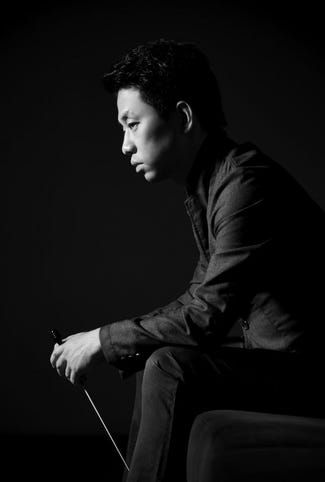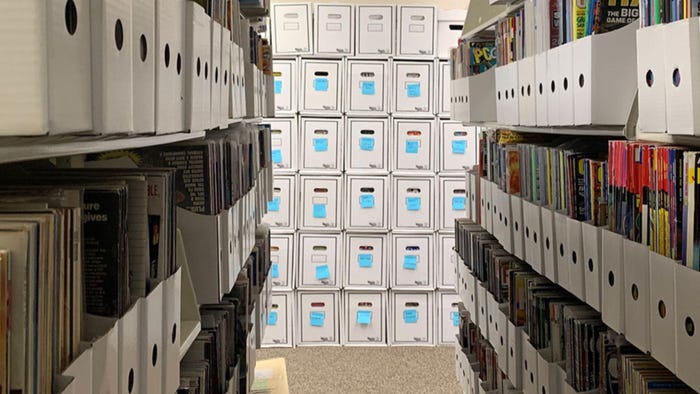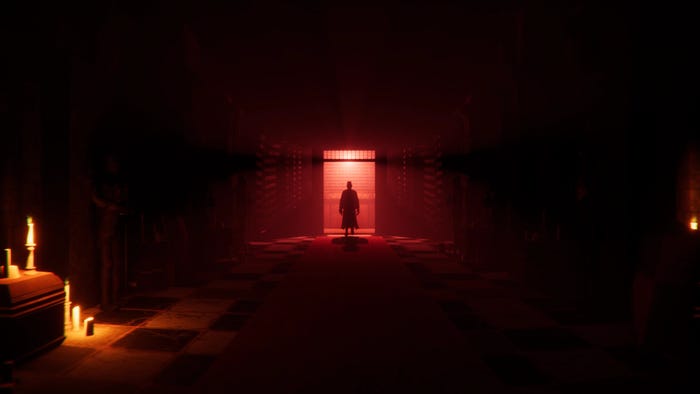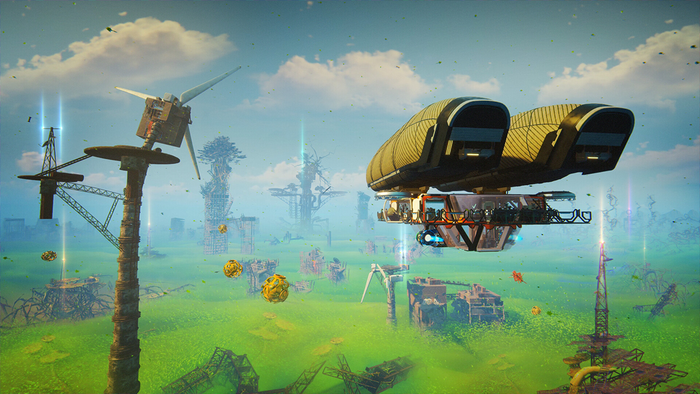"It was imperative for the music to function in a restrained and suggestive manner and not overwhelm or verbosely spoon-feed emotion."

After almost 10 years in development, Fumito Ueda's spiritual successor to his classics Ico and Shadow of the Colossus finally landed on shelves earlier this month.
On the surface The Last Guardian is an otherworldly adventure through a dangerous land draped in shadow and mystery. Drill down, though, and you'll find something altogether more human. A tale of a boy and beast -- in this case, a cat-bird-dog creature called Trico. It's a relationship that anchors players in The Last Guardian's strange world, and as they become more emotionally invested, it evolves to become the game's driving force.
One person who knows more than most about bringing that relationship to life is The Last Guardian composer, Takeshi Furukawa. In a recent Q&A with Gamasutra, Furukawa spoke at length about the challenges of creating a naturalistic, emotive score, and shed some light on his involvement with the project, which began around five years ago.
The Last Guardian has been in development for almost a decade. When did you jump on board?
 Takeshi Furukawa: I joined the project about five years ago when Tommy Kikuchi, the music producer who also supervised the music for Shadow of the Colossus, invited me to submit a demo for the game. However, creative work was temporarily suspended shortly thereafter as the game was transitioned to the PlayStation 4 platform. My composing efforts therefore started in earnest about three years ago, and lasted until early this spring.
Takeshi Furukawa: I joined the project about five years ago when Tommy Kikuchi, the music producer who also supervised the music for Shadow of the Colossus, invited me to submit a demo for the game. However, creative work was temporarily suspended shortly thereafter as the game was transitioned to the PlayStation 4 platform. My composing efforts therefore started in earnest about three years ago, and lasted until early this spring.
Has the game changed much during that time?
Details such as level design and gameplay mechanics were altered and refined as development progressed, however Ueda-san’s overall vision remained singular. The game has always simply focused on the intimate bond between the boy and Trico, never aspiring to dazzle with gratuitous gimmicks or superfluous spectacle.
While some of the aforementioned changes required the music to be conformed through revisions and re-writes, the overall vision for the score also remained unchanged since its inception. From the onset, the development team and I had aspired to create a poignant orchestral soundtrack hopefully as timeless and inspiring as those that touched our lives as a child.
Could you talk us through the scoring process? How does your experience working on The Last Guardian, and video games in general, differ from your work in film and TV?
The scoring process on any project depends on the relationship dynamic between the composer and the director. In some cases, the composer is given precise instructions by a director wishing to exercise closer control. In others, where there is a higher level of previously established trust, the composer may be accorded more room to work autonomously.
For The Last Guardian, I was very fortunate as Ueda-san entrusted me with a lot of freedom concerning musical details. He had a clear vision for the score to be as cinematic as possible, but always gave direction in broader and conceptual terms.

As Ueda-san and his team were in Tokyo, we stayed in close contact via video conferences. I interfaced more often with (Tsubasa) Ito-san, the lead audio as is customary with development on larger studio titles.
"The scoring process on any project depends on the relationship dynamic between the composer and the director."
After analyzing and discussing the musical needs of each scene, I retreated to my studio to write electronic mock-ups ultimately to be replaced by live musicians. Once composition of a cue was complete, I proceeded with orchestration and preparation of sheet music necessary for the recording session.
For The Last Guardian, we elected to record with the London Symphony Orchestra, Trinity Boys Choir, and the London Voices at AIR Studios’ world-renowned Lyndhurst Hall. We selected the LSO in lieu of session musicians, as a concert orchestra has a wonderfully cohesive sound hard to emulate with a studio ensemble assembled on the spot. Once the recordings were complete, the score was handed off to a mix engineer to be completed and delivered in surround sound.
The reigns were then passed to Ito-san for editing and integrating into the game. This perhaps is one difference between video game score and film scores, where the composer doesn’t have complete control of how a cue is fitted to picture. As such, on The Last Guardian many of the cues were thereafter edited to suit the needs of particular scenes, ultimately leading to results that were personally unexpected yet pleasantly surprising.
How much inspiration did you pull from The Last Guardian’s spiritual predecessors, Ico and Shadow of the Colossus? Did you speak with Ōshima-san or Ōtani-san about their work at all?
I haven’t had the pleasure of becoming acquainted with Ōshima-san or Ōtani-san, and look forward to such a privilege. Both ICO and Shadow of the Colossus are seminal scores, and I aspired for The Last Guardian’s music to likewise have a unique identity. To this end, I felt it best to start with a completely blank canvass neither being conscious of nor deliberately avoiding the heritage of the previous soundtracks.

Could you tell us a bit more about what influenced and shaped the score, aesthetically?
Absolutely. I found myself drawn to anything and everything with a muted aesthetic while working on The Last Guardian, from Impressionist art and music, French cinema, to even fashion and design featuring a pastel palette. Akin to method-acting, I felt it beneficial to submerge myself in such an aesthetic, and to be inspired and hopefully learn a thing or two by osmosis.
It's clear from the footage we've seen that at the core of The Last Guardian is the relationship between the boy and Trico. How did you look to weave that emotional thread into the score?
Addressing the emotional core of this poignant game was ironically one of the greater challenges. Ueda-san’s work is characterized by a wonderful sense of ambiguity, allowing each player to experience the narrative according to their own interpretation.
"It was imperative for the music to function in a restrained and suggestive manner and not overwhelm or verbosely spoon-feed emotion."
Therefore, it was imperative for the music to likewise function in a restrained and suggestive manner and not overwhelm or verbosely spoon-feed emotion. As this ethos contradicts the exact purpose of underscore, I needed to tread a fine line properly balancing the tone of the music against picture.
I was convinced that the emotional aspects of the game were sufficiently conveyed by the stunningly expressive animations, and felt that to further underscore it musically would be an unnecessary reiteration. To this end, the music avoids directly playing the emotional aspects instead highlighting the cinematic grandeur of the narrative and locale.
By employing such a method, I believe the score was able to contribute the right amount of emotional amplitude, and moreover help elevate the intimate story between the boy and Trico to a scope larger than life.

How do you know it's time to step away from a specific piece? Were any tracks particularly difficult to perfect?
The final deadline is when I step away, or perhaps more appropriately "let go" of the music. I don’t work in a linear fashion composing one piece to completion then moving onto the next, but instead compose on multiple cues in tandem. This workflow allows me to cohesively shape the entire score as a whole instead of in fragments.
There weren’t any specific cues harder than others, however as with all composing efforts, solidifying the score’s themes initially proved to be the most challenging aspect.
Based on your experiences, what advice would you give to other composers looking to work in the games industry?
There is the customary advice to invest ten thousand hours refining one’s craft, as great music transcends boundaries whether it is for games, films, or the concert hall. However, more important in my humble opinion is to nurture one’s character and cultivate knowledge.
Music, like all other artistic endeavors, is a mirror that reflects its creator. One should aspire to be worldly and well-read, experience the exotic, and never hesitate to be opinionated. Those who live the most interesting and at time unorthodox lives, will have the most colorful palette of experiences to draw from. Music composed by those who settle for the mundane will sound just as shallow and generic.
Specific to the video game format, one must remember that modern game development is a massive operation involving the coordinated efforts of hundreds of artists and engineers. As a composer, you alone are entrusted to steer the musical direction, and this can be seen as a great risk for the developers with millions of dollars at stake.
Embracing a collaborative mentality and inspiring confidence in your colleagues is imperative, as well as being able to serve the director’s vision without being an obsequious yes-man.

Is there a particular track from the score that holds a special place in your heart?
My personal favorite is "Finale II: Escape" on the soundtrack album, one of the bigger and emotionally robust cues also used in several of the trailers. After restraining the emotional voltage for much of the score, it was nice to finally be able to cut loose for this particular cue.
The piece was originally intended to underscore the final moments of the game, however Ueda-san had a last-minute idea to substitute its most climactic section with a different part from the score. His vision was brilliant and further elevated the impact of the scene. Therefore, even though this piece doesn’t appear in the game in its entirety, it holds a special place in my heart as one of the cues I most enjoyed composing.
[Furukawa portrait: Dustin Snipes]
About the Author(s)
You May Also Like









